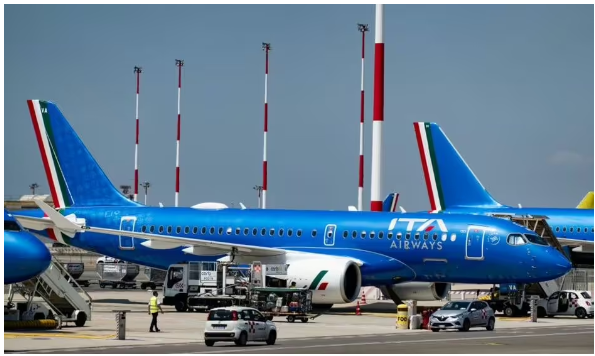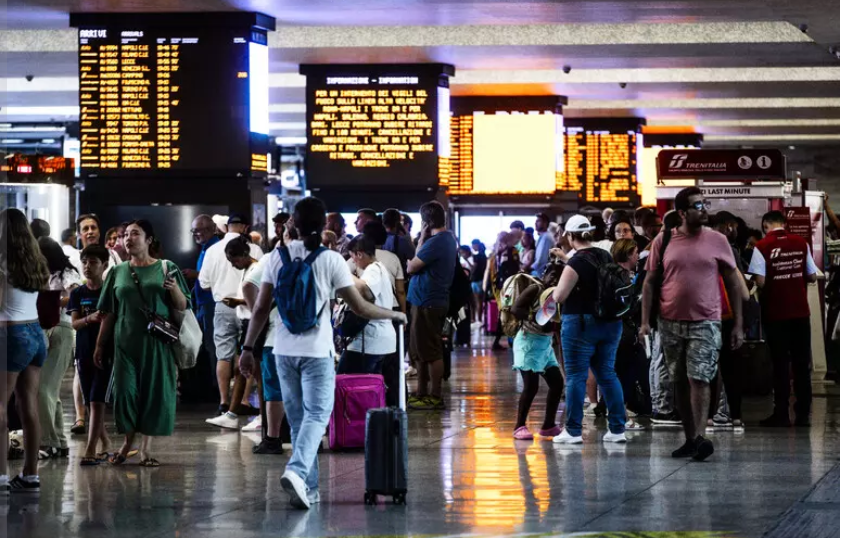 Today, Italy’s transportation sector is experiencing widespread chaos due to a nationwide strike by unionized air travel personnel. The strike, which began at 00:01 and is set to last until 23:59 on September 24, involves thousands of flight attendants, ground staff, and baggage handlers across major airports, including Rome Fiumicino, Milan Malpensa, Venice Marco Polo, and Milan Linate.
Today, Italy’s transportation sector is experiencing widespread chaos due to a nationwide strike by unionized air travel personnel. The strike, which began at 00:01 and is set to last until 23:59 on September 24, involves thousands of flight attendants, ground staff, and baggage handlers across major airports, including Rome Fiumicino, Milan Malpensa, Venice Marco Polo, and Milan Linate.
The strike is being led by multiple labor unions representing flight and ground staff from airlines like ITA Airways, Air Dolomiti, Wizz Air, and EasyJet. These unions are demanding better working conditions, including improved pay, more manageable working hours, and better overall job security. Ground staff, in particular, are calling for changes to contractual agreements, improved safety conditions, and more support from management, citing the pressures of understaffing and overwork as significant issues.
The strike comes after a series of unsuccessful negotiations between unions and airline management, and the unions argue that current working conditions have become untenable, particularly in light of the high demand for travel post-pandemic. They are pushing for reform and increased benefits, hoping to alleviate the strain on workers who have had to contend with an influx of travelers as the aviation industry rebounds.
The impact on passengers has been significant. Major airlines, including ITA Airways and Wizz Air, have been forced to cancel numerous flights, while others have experienced major delays. EasyJet has reduced its work stoppage to a four-hour window from 13:00 to 17:00, but other carriers and airport personnel are observing a full-day strike. Milan Malpensa and Rome Fiumicino, two of Italy’s busiest airports, have been hit the hardest, with lengthy security lines, delayed check-ins, and last-minute flight cancellations.
Travelers have been advised to reconfirm their flight reservations, expect delays, and avoid checking out of accommodations until their onward travel is secured. Many are also encouraged to arrive at the airport earlier than usual to manage the expected delays in check-in and security procedures. Those flying with airlines participating in the strike have been particularly vulnerable to cancellations.
The strike extends beyond major hubs to regional airports like Bologna Guglielmo Marconi Airport, where ground staff are participating in a partial stoppage from 12:00 to 16:00. Other airports such as Venice Marco Polo and Milan Linate are also experiencing disruptions, although the severity varies depending on the number of participating workers at each location.
Authorities have increased security at airports to handle potential protests, though there have been no reports of significant disturbances so far. Nonetheless, airport terminals are overcrowded, and frustration is growing as many travelers face uncertainty about when they will be able to depart.
The air travel strike is part of a larger wave of labor unrest in Italy’s transportation sector. Earlier in the month, rail workers in Lombardy announced a planned strike at the end of September, adding to the sense of instability in the country’s transportation infrastructure. Unions are increasingly vocal about the need for reform and are calling on the government to intervene in labor disputes to prevent further disruption.
 The Italian government has expressed concern over the impact of these strikes on the economy, especially in the tourism sector, which is highly dependent on smooth transportation operations. However, as of now, there have been no new negotiations scheduled, and it remains unclear how long the air travel disruptions will last.
The Italian government has expressed concern over the impact of these strikes on the economy, especially in the tourism sector, which is highly dependent on smooth transportation operations. However, as of now, there have been no new negotiations scheduled, and it remains unclear how long the air travel disruptions will last.
Airlines affected by the strike have scrambled to accommodate stranded passengers. ITA Airways and Wizz Air have offered to rebook travelers on later flights, though availability is limited due to the large number of cancellations. Some airlines have offered compensation to passengers, but this has done little to ease the frustration of those who have had their travel plans disrupted.
Travelers, many of whom were unaware of the strike before arriving at the airport, have expressed frustration over the lack of clear communication from airlines. Social media platforms have been flooded with complaints about the lack of contingency planning and the chaotic scenes at airport terminals across the country. Some tourists, especially those with international connections, have been forced to book alternate flights at significant personal expense to avoid being stranded.
While the strike is expected to end at midnight, the ripple effects on Italy’s air travel infrastructure will likely last for several days. Airlines will need time to clear the backlog of flights, and passengers who had their flights canceled may face long waits for rebooked flights.
This strike underscores the tension between labor unions and management in Italy’s aviation industry. As air travel demand continues to grow, these disputes over working conditions and contracts are unlikely to disappear. Passengers traveling in the coming weeks are advised to keep a close eye on airline announcements and be prepared for potential disruptions as the situation evolves.
Ennywealth


